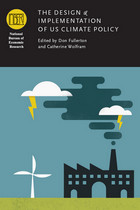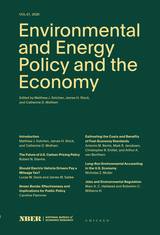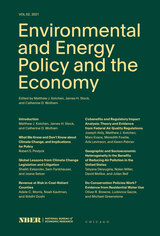3 books by Wolfram, Catherine D.

The Design and Implementation of US Climate Policy
Edited by Don Fullerton and Catherine D. Wolfram
University of Chicago Press, 2012
Economic research on climate change has been crucial in advancing our understanding of the consequences associated with global warming as well as the costs and benefits of the various policies that might reduce emissions of greenhouse gases. As nations work to develop climate policies, economic insights into their design and implementation are ever more important.
With a balance between theoretical and empirical approaches, The Design and Implementation of US Climate Policy looks at the possible effects of various climate policies on a range of economic outcomes. The studies that comprise the volume examine topics that include the coordination—or lack thereof—between the federal and state governments, implications of monitoring and enforcing climate policy, and the specific consequences of various climate policies for the agricultural, automotive, and buildings sectors.
[more]

Environmental and Energy Policy and the Economy
Volume 1
Edited by Matthew J. Kotchen, James H. Stock, and Catherine D. Wolfram
University of Chicago Press Journals, 2020
This volume presents six new papers on environmental/energy economics and policy. Robert Stavins evaluates carbon taxes versus a cap-and-trade mechanism for reducing greenhouse-gas emissions, arguing that specific design features of either instrument can be more consequential than the choice of instrument itself. Lucas Davis and James Sallee show that the exemption of electric vehicles from the gasoline tax is likely to be efficient as long as gasoline prices remain below social marginal costs, even though it results in lower tax revenue. Caroline Flammer analyzes the rapidly growing market for green bonds and highlights the importance of third-party certification to the financial and environmental performance of publically traded companies. Antonio Bento, Mark Jacobsen, Christopher Knittel, and Arthur van Benthem develop a general framework for evaluating the costs and benefits of fuel economy standards and use it to account for the differences between several recent studies of changes in these standards. Nicholas Muller estimates a measure of output in the U.S. economy over the last 60 years that accounts for air pollution damages, and shows that pollution effects are sizable, affect growth rates, and have diminished appreciably over time. Finally, Marc Hafstead and Roberton Williams illustrate methods of accounting for employment effects when evaluating the costs and benefits of environmental regulations.
[more]

Environmental and Energy Policy and the Economy
Volume 2
Edited by Matthew J. Kotchen, James H. Stock, and Catherine D. Wolfram
University of Chicago Press Journals, 2020
This volume presents six new papers on environmental and energy economics and related policy issues. Robert Pindyck provides a systematic overview of what is known, and remains unknown, about climate change, along with the implications of uncertainty for climate policy. Shaikh Eskander, Sam Fankhauser, and Joana Setzer offer insights from a comprehensive data set on climate change legislation and litigation across all countries of the world over the past thirty years. Adele Morris, Noah Kaufman, and Siddhi Doshi shine a light on how expected trends in the coal industry will create significant challenges for the local public finance of coal-reliant communities. Joseph Aldy and his collaborators analyze the treatment of co-benefits in benefit-cost analyses of federal clean air regulations. Tatyana Deryugina and her co-authors report on the geographic and socioeconomic heterogeneity in the benefits of reducing particulate matter air pollution. Finally, Oliver Browne, Ludovica Gazze, and Michael Greenstone use detailed data on residential water consumption to evaluate the relative impacts of conservation policies based on prices, restrictions, and public persuasion.
[more]
READERS
Browse our collection.
PUBLISHERS
See BiblioVault's publisher services.
STUDENT SERVICES
Files for college accessibility offices.
UChicago Accessibility Resources
home | accessibility | search | about | contact us
BiblioVault ® 2001 - 2024
The University of Chicago Press









